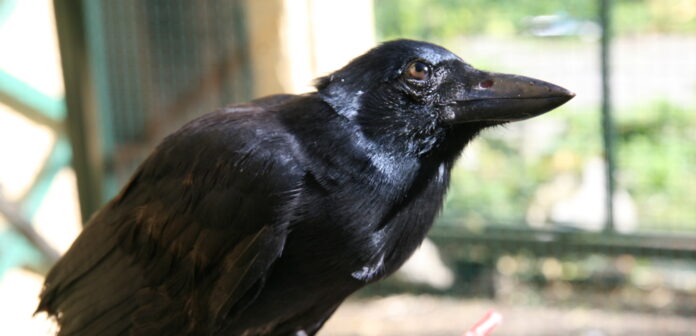The New Caledonian Crow: In the vast realm of avian intelligence, the New Caledonian crow (Corvus moneduloides) stands out as an extraordinary example of cognitive prowess. Recent research has illuminated the astounding mental capabilities of these birds, revealing that they are not only adept at crafting simple tools but are also capable of solving complex problems. From creating paper tokens to operate vending machines to exhibiting advanced problem-solving strategies, these crows are redefining our understanding of avian intelligence.
The Evolution of Avian Intelligence
For years, scientists have suspected that corvids, a family that includes crows, ravens, and magpies, possess a level of intelligence far exceeding traditional expectations for non-mammalian species. The New Caledonian crow, in particular, has emerged as a central figure in these discussions due to its impressive cognitive abilities.
Recent studies conducted by neurobiologists have offered new insights into how these birds make strategic decisions. Their brain activity and problem-solving processes are strikingly similar to those of humans, despite the vast evolutionary distance between the two species. This revelation has significant implications for our understanding of how intelligence evolves in different species.
Crafting Complexity: The Ingenious Crows
One of the most striking behaviors observed in New Caledonian crows is their ability to create and use tools. These crows have been seen fashioning paper tokens to retrieve food from vending machines, a testament to their problem-solving skills. This behavior illustrates not only their capacity for complex thought but also their ability to innovate in novel situations.
Furthermore, these crows have demonstrated advanced problem-solving techniques, such as using sticks and leaves to extract insects from crevices. They exhibit a sophisticated understanding of cause and effect, which is rare in the animal kingdom.
Neurobiological Insights: A Comparative Analysis
Pioneering research by experts like ornithologist Andreas Nieder has shed light on how New Caledonian crows process information differently from humans. Despite the vast differences in evolutionary history—crows being descendants of dinosaurs and humans evolving from primates—both species exhibit similar neural mechanisms when making decisions. This discovery suggests that cognitive processes might be more universal than previously thought.
Nieder’s research highlights that while the brain structures of crows and primates are fundamentally different, the neurons responsible for decision-making in both species function in comparable ways. This insight not only broadens our understanding of avian intelligence but also offers a new perspective on the cognitive capacities of non-mammalian species.
Social Structure and Cooperative Behavior
In addition to their individual problem-solving skills, New Caledonian crows display remarkable social behavior. They live in complex social groups and work together to achieve common goals. This cooperative behavior is evident in how they share resources and assist one another in problem-solving tasks.
For instance, crows have been observed working together to access food sources that would be otherwise unreachable. This cooperative behavior reflects a high level of social intelligence and suggests that these birds are capable of advanced social interactions.
Implications for Understanding Non-Mammalian Cognition
The study of New Caledonian crows offers valuable insights into the cognitive capabilities of non-mammalian species. By examining how these birds think and solve problems, scientists can gain a better understanding of how intelligence can manifest in different evolutionary paths.
The comparison between avian and mammalian cognition also opens new avenues for research into the nature of intelligence itself. If crows and primates, despite their different evolutionary backgrounds, exhibit similar decision-making processes, it suggests that certain cognitive strategies may be more widespread across the animal kingdom than previously assumed.
Potential Insights into Extraterrestrial Intelligence
Some researchers have even speculated that studying the cognitive processes of non-mammalian species like the New Caledonian crow could provide insights into how intelligence might function in extraterrestrial life forms. Since these birds exhibit complex problem-solving skills and advanced cognitive abilities, they could serve as a model for understanding how intelligence might evolve in entirely different environmental contexts.
The New Caledonian crow represents a fascinating case study in avian intelligence. Their ability to create tools, solve complex problems, and exhibit advanced social behavior challenges traditional notions of animal cognition. By exploring the cognitive capabilities of these remarkable birds, scientists are not only expanding our understanding of intelligence across species but also paving the way for new discoveries in the broader field of cognitive science.
As research continues to unveil the intricacies of avian intelligence, the New Caledonian crow stands as a testament to the incredible potential of non-mammalian species. Their cognitive abilities remind us that intelligence is a multifaceted trait that can evolve in diverse ways, offering a glimpse into the complex and varied nature of minds across the animal kingdom.








[…] Read More: New Caledonian Crows: Unveiling the Remarkable Intelligence of the World’s Smartest Bird […]